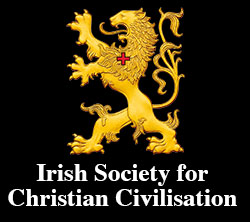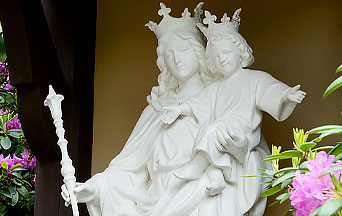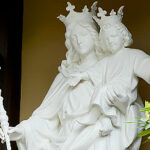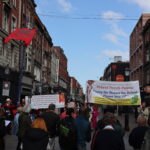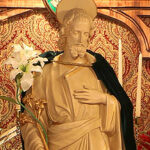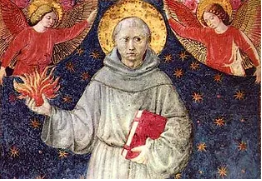
Anthony was born Fernando Martins in Lisbon, Portugal, in August, 1195. His noble and wealthy family arranged for him to be instructed at the Cathedral school where he was instilled with a deep religious piety.
At fifteen, Fernando entered the Augustinian Order at the Abbey of Saint Vincent on the outskirts of Lisbon and there studied theology, Latin and the Holy Scriptures.
It was after his ordination to the priesthood that Fernando first came into contact with some Franciscan friars who settled near his monastery.
From the beginning, Fernando was strongly attracted to the simple, evangelical lifestyle of the friars. However, it was not until the news came of the first martyrs of their order – five Franciscans beheaded in Morocco – and Fernando saw their mutilated bodies, which had been ransomed, being buried in the Abbey of Santa Cruz, that he obtained permission to leave the Augustinian Order and join the Franciscans, where he received the new name of Anthony.
So inspired was he by the martyrs’ example that he set out for Morocco himself, with the hope of becoming a martyr too. However, he fell seriously ill en route and was forced to return to Portugal to regain his health. According to the designs of Divine Providence, on the return voyage, the ship was blown off course and landed in Sicily.
From Sicily he made his way to Tuscany where he was assigned to a convent of the order, but he was later assigned to the rural hermitage of San Paolo near Forlì, Romagna, a choice made after considering his poor health. There he lived in a cell made by one of the friars in a nearby cave and spent his time in private prayer and study.
One day, in 1222, in the town of Forli, on the occasion of an ordination, Anthony was persuaded to be the homilist. So simple and resounding was his teaching of the Catholic Faith that even the most unlettered and innocent might understand it and it made a great impression on all who heard. Not only his rich voice and arresting manner, but the entire theme and substance of his discourse and his moving eloquence, held the attention of his hearers. Everyone was impressed with his knowledge of Scripture, acquired during his years of solitude at the hermitage of Forli.
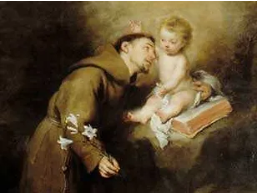
Anthony was known as the “hammer of the heretics” in Italy. His great protection against their lies and deceits in the matters of Christian doctrine was to utter, simply and innocently, the Holy Name of Mary. Outstanding among the stories of his dealings with the heretics – who would not listen to him as he tried to teach them the truths and joy of the Gospel – is the one which recounts how he became so frustrated one day by their stubbornness that he went out and preached to the fishes, who gathered in droves to listen attentively to his words, poking their heads up out of the water and refusing to leave until they had received the saint’s blessing.
Humility Is Compatible with the Rich Dress of One’s Office
Anthony died in 1231, at the age of thirty-five, and was canonised by Pope Gregory IX less than a year later. He was declared a Doctor of the Church and is especially invoked as the patron saint of lost articles. His feast day is June 13th.
This year, it is more crucial than ever that we turn to prayer and intercession to increase devotion to Our Lady across our country. That’s why you’re invited to join us in the Three Hail Marys Pledge, a powerful devotion that can bring personal spiritual benefits and national transformation. By reciting three Hail Marys daily, you honour the Immaculate Heart of Mary and seek her intercession for the conversion of sinners, the salvation of souls and the restoration of Ireland’s Catholic Faith. This ancient devotion, revealed to Saint Mechtilde, promises spiritual benefits including protection from mortal sin and the assurance of a good death. Your daily prayers will contribute to an increase in devotion to Our Lady, the conversion of sinners and the moral renewal of our country. Let us commit to this powerful devotion and seek the guidance and protection of Our Lady.


